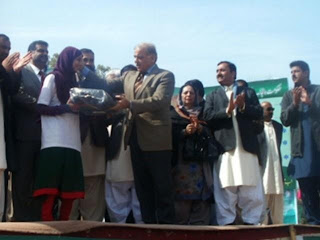Wary of the rising political capital of Imran Khan in the plains of Punjab, the provincial government led by the erstwhile Chief Minister Shahbaz Sharif has unleashed the most valuable weapon in its arsenal to target the urban youth who are, by far, the vanguard of Pakistan Tehrik-i-Insaaf.
Carrying a price tag of three billion rupees, the laptop distribution scheme is supposed to benefit the brightest across campuses across province. The money earmarked to launch this laptop onslaught is meant for the development of the whole province, slicing it off from the Annual Development Programme (ADP) of the province.
The chief minister aides believe that the scheme would go a long way in attracting the bulk of the youth from the province who, at the moment, have put their weight in the favor of the promise of change by Imran Khan. Confidantes of the chief minister also believe that when these laptops – purchased by public money – go to students, the entire neighbourhood would sway politically in favour of PML-N. However, detractors of the chief minister are of the view that the scheme would miserably fail just like sasti roti, food stamp, yellow cab and Ashiana schemes. Critics also point out that the Election Commission must take notice of the misuse of public money in an election year.
Using laptops as a political tool is the latest attempt in the vehemently contested duel for supremacy between the PML-N and the PTI. Just a few months back, the PML-N launched Nawaz Sharif’s daughter Maryam Nawaz to woo the students of the province. Maryam, while visiting campuses in the city, took the political temperature of the youth and is still active in spreading this youth appeal in the students. After the political heir-apparent Hamza Shahbaz was hit by one scandal after another, Maryam was the answer from the PML-N for the youth of Punjab. The initiative, however, after making early headlines is fading fast.
Unlike PPP and PML-N, the problem between PTI and PML-N is that they are both vying for the same vote-bank. Before Imran’s star started shining on the horizon, PML-N was the sole propertier of this very valuable bank. But more than the youth, it had its appeal in the urban trader and merchant class who were considered the home constituency for the Sharif family, while the youth associated with this class naturally fell to the Sharifs as well.
Now, however, the dynamics have become different. Imran, sensing his chance based on his unmatched chrisma and impeccable public service record, leapt to grab this mass of voters that was lying unclaimed. The youth, frustrated, given the torturous machinations of power politics, responded with zeal to the call, setting up stage for a long drawn out political tussle between the two parties. If you take away urban seats of Punjab from the PML-N, it immediately falls down to the level of minor provincial party instead of major national player that it has become now. And if Imran has to score big, he has to attract the urban middle class families and youth.
Interestingly, both the parties are not heading to the country-side which is largely considered PPP’s domain, though PTI would definitely strive at some point for those seats as well. Thus the GT Road, a road dissecting Punjab vertically, is bastion of PML-N and coincidentally, this is the area where Imran is fancying his chances. However, the fact of the matter is this coveted line has shown no signs of desertion in favour of Imran like some constituencies did in south Punjab. When someone like Rana Nazir, Rana Tanvir and Raja brothers from Jehlum defect for the PTI, that will be the time when the Sharifs would consider calling it a day.
As for PTI, Imran would continue to step-up the pressure on Sharifs and then countdown to see if the PML-N wilts. The stage is set, the battle-lines drawn, the up and the coming challenger is staring straight at Sharifs, let’s see who blinks first.








